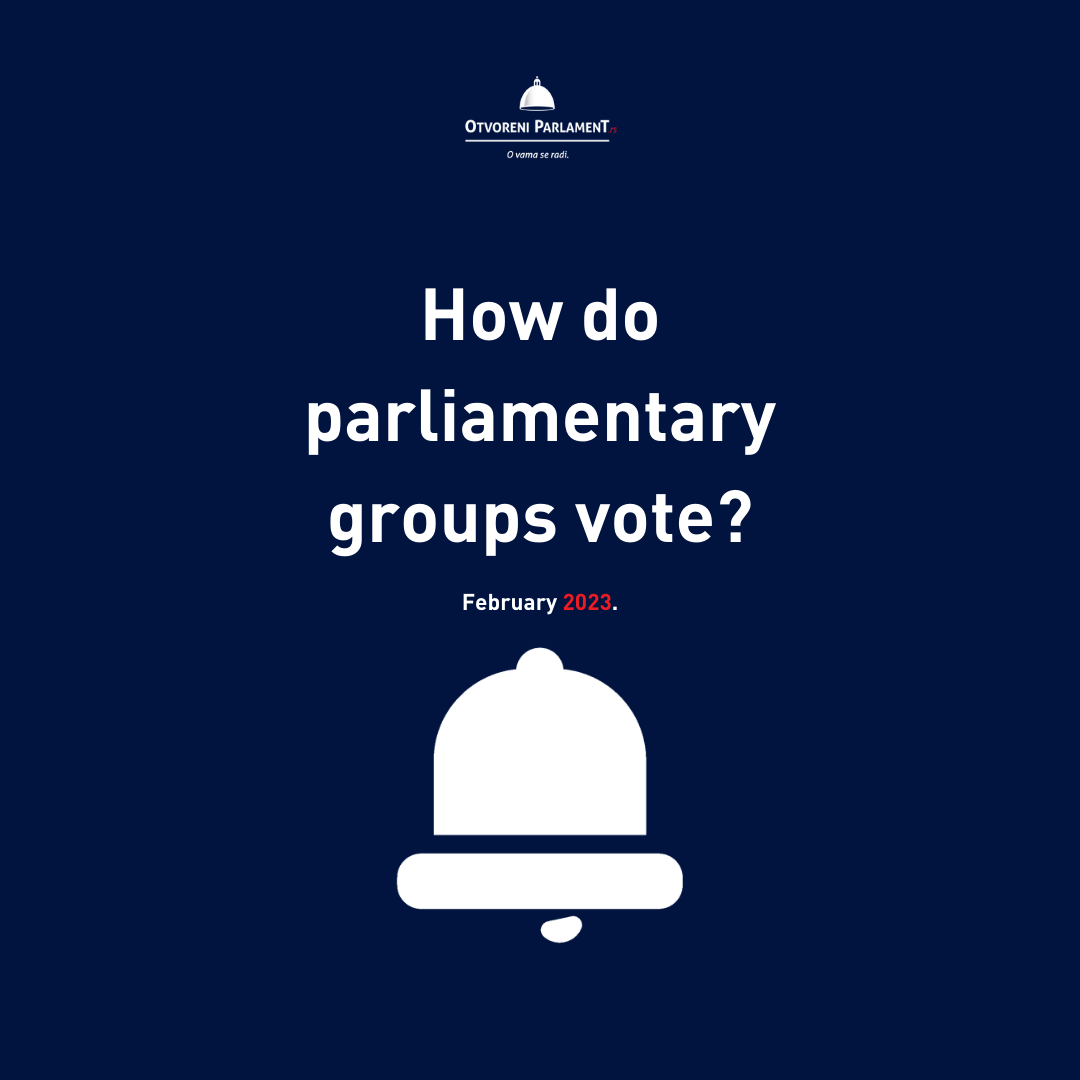
The polarisation between MPs of the incumbent coalition and the opposition is reflected in the results of voting on laws and essential acts. The data show that, on a fundamental level, the space for overcoming party divisions is not visible when it comes to matters of public interest. Moreover, while the voting data indicates the consolidated ranks of the ruling majority, the situation in the ranks of the opposition is different, although positioned against the decisions of the majority. Circumstances in which MPs of the opposition vote in favour of an act usually refer to the ratification of some international agreements or decisions of a technical nature, such as changes in the composition of parliamentary committees.
During February 2023, there were three voting days, and the MPs voted on 60 acts – 14 laws, 20 international treaties, seven acts concerning the functioning of the Assembly and 19 other acts, such as conclusions on reports of independent institutions. The trend initiated in the autumn session of the Thirteenth Convocation continued in February – the ruling majority disciplinedly voted ‘For’, while the opposition MPs were often not present on the day of voting, and when they were – they predominantly voted ‘Against’.
We will analyse what the voting of the ruling majority and the opposition during February looked like in the following text, on the basis of the official data of the National Assembly on voting.
Incumbent majority: once against all of them
MPs of the incumbent majority mostly attended the votes on the acts and voted ‘For’. Only one, out of 160 MPs of the ruling majority, voted ‘Against’ once in February. (Chart 1). At the same time, this is the only vote ‘Against’ that came from the representatives of the ruling majority since the beginning of the convocation.
Chart 1: Percentual overview of voting on acts by parliamentary groups of the incumbent majority – February 2023
MP Marijan Rističević, who voted against, explained his vote: “I didn’t vote and I violated some discipline in the parliamentary club, because I didn’t vote to expel a farmer, to be honest, I didn’t vote. My colleague Miletić did not vote either, he abstained, I voted against expelling a farmer from the Committee...”. MP Rističević is a member of the SNS parliamentary group, and is the leader of the People’s Peasant Party.
Opposition: we are against, it’s just that we’re not there
Voting by MPs from opposition parliamentary groups is characterised by a greater absence from voting day compared to MPs from the ruling majority. On the other hand, the results of the voting are more varied among the present opposition MPs. (Chart 2).
Chart 2: Percentual overview of voting on acts by the opposition parliamentary groups – February 2023
Unlike the incumbent majority, for which voting ‘against’ almost never happens, opposition MPs sometimes do vote for certain acts. In the votes on the acts in February, there were a total of 302 opposition votes ‘For’. Nevertheless, out of the total number, only two votes of the opposition MPs were for the adopted laws, while the remaining 300 votes were mostly cast to the ratification of international agreements and decisions of a technical nature. The laws that received one ‘For’ vote each from the opposition MPs are the laws on amendments to the Law on the Organisation and Competence of State Authorities in War Crimes Proceedings and the Law on the Organisation and Competence of State Authorities to Fight High-Tech Crime. Moreover, the opposition did not have a single vote ‘against’ 12 acts – seven international treaties and five decisions on changes in the membership of parliamentary committees. Of the 25 acts with the minimum number of votes ‘Against’ votes, 23 referred to the functioning of the Assembly and international agreements. The remaining two acts are the conclusion on the work of the Fiscal Council and the appointment of the permanent composition of the Republic Electoral Commission.
When it comes to the absence of opposition MPs from the voting day in February, 16 out of a total of 78 MPs from opposition parliamentary groups did not attend a single voting on acts. In four parliamentary groups, absenteeism was prevalent – MPs from these parliamentary groups were absent more often than they participated in the voting day.
When talking about MPs who are not members of parliamentary groups, another rule can be observed when it comes to voting – even though they are formally neither part of the ruling majority nor the opposition, these MPs for the most part consistently vote either dominantly ‘For’ or dominantly ‘Against’, that is, they practically choose the side according to which they always vote. And the way they vote is in accordance with that, namely MPs who vote in accordance with the ruling majority never vote ‘Against’, and MPs who vote in accordance with the opposition are often absent from voting. In this group, two out of a total of 12 MPs did not even attend the vote on acts in February. (Chart 3)
Chart 3: Percentual overview of voting on acts by MPs who are not members of parliamentary groups – February 2023
Assessment of the MPs’ voting on the acts in February 2023:
Mostly unaccountable
With the exception of the parliamentary groups: United, Green-Left Club, DS and Oath-Keepers, the MPs were mostly unaccountable towards the voting on the acts during the last month – either they voted according to the received guidelines and not according to their conscience, or they did not come to vote.
What is accountability in the work of MPs? Among other things, it implies that “when the moment comes, MPs should not vote by the bell, but should honestly, conscientiously and faithfully to the Constitution, human rights and civil liberties express themselves about what is written in the law.”
Next month, MPs will have the opportunity to improve their grade, we will see if they will seize it.